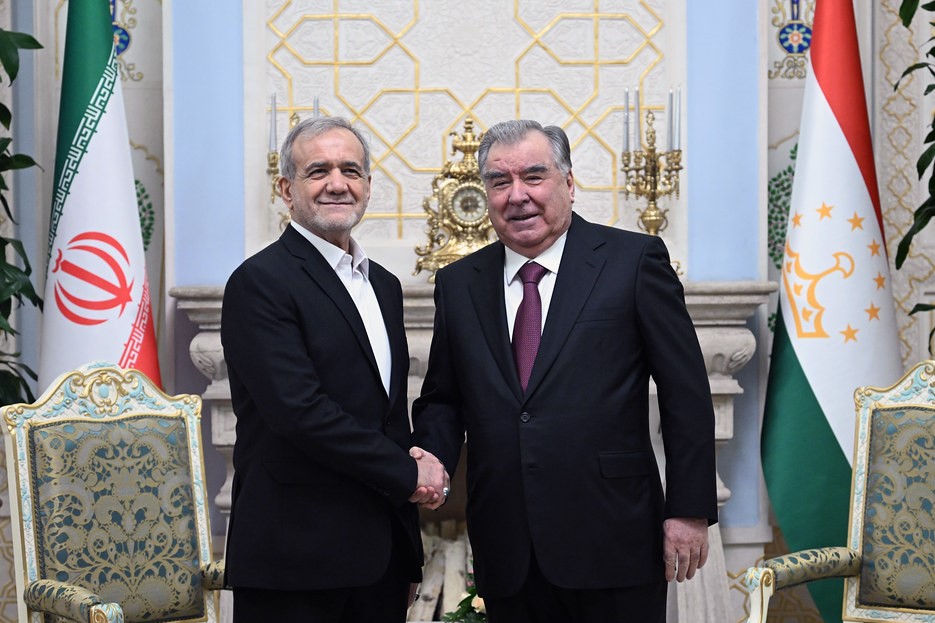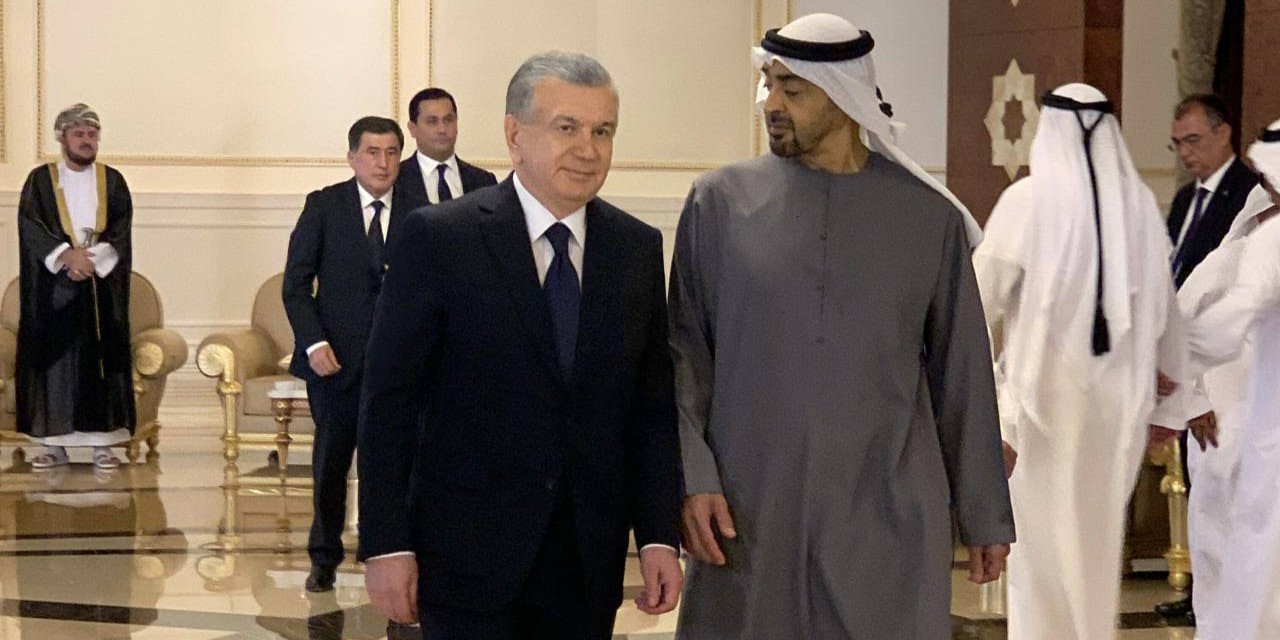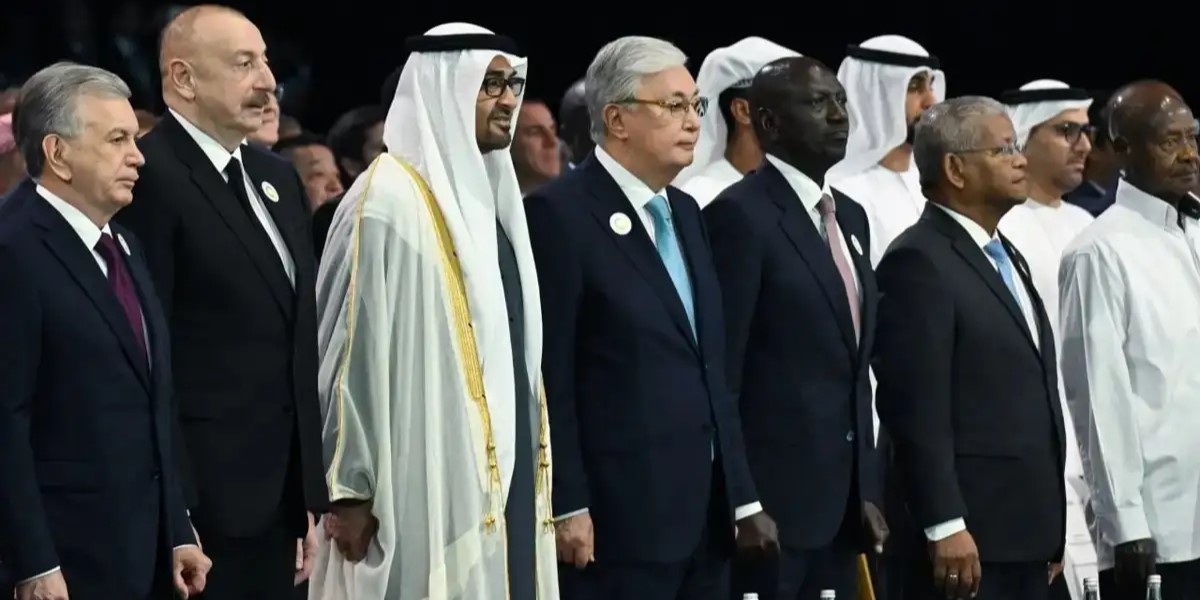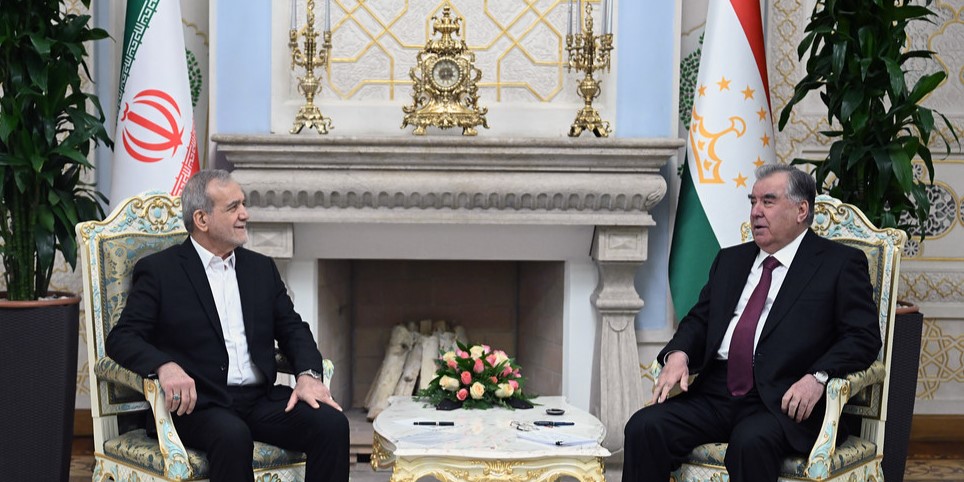Last week, the media in the region reported on the U.S.’s decision to sanction Keremet Bank. They also covered Presidents Mirziyoyev and Tokayev’s respective visits to the UAE and their attendance at the Adu Dhabi Sustainability Week summit. Several sources noted President Trump’s Secretary of State nominee, Marco Rubio, is considering removing trade restrictions on Central Asian states. Multiple outlets also discussed Iranian President Masoud Pezeshkian’s visit to Tajikistan. They also reported on AD Ports Group’s investment in Aktau Port and the construction of the TAPI pipeline.

Iranian President Masoud Pezeshkian visited Tajikistan as part of his regional tour. Source: Asia Plus
Sanctions
The United States Treasury Department imposed sanctions on Keremet Bank in Kyrgyzstan (Daryo). The bank allegedly participated in a sanctions evasion scheme involving the Russian bank Promsvyazbank (PSB). PSB, which was nationalized in 2018, specializes in large defense contracts. Keremet is accused of helping PSB evade sanctions by facilitating cross-border payments. According to reports, Ilan Mironovich Shor, a Russian oligarch subject to U.S. sanctions, reputedly participated in discussions on Kermet’s involvement. In 2024, a Russian oligarch and the Russian government bought a controlling stake in the bank from the Kyrgyzstani government to turn the bank into a center for sanctions evasion. The National Bank of Kyrgyzstan commented on the situation, stating that it continues to monitor the problem but that the Kyrgyzstani banking sector remains stable (24.kg). In response, Keremet Bank said it intends to challenge the decision with the U.S. Office for Foreign Assets Control (Kursiv).
Trade
Last week, the Kyrgyzstani Ministry of Economy and Commerce launched the 2025-2028 National Export Program “Made in Kyrgyzstan” (Daryo). The initiative aims to bolster the country’s exports by aiding companies in accessing new foreign markets and enhancing global recognition of Kyrgyzstani produce. Businesses will have increased access to foreign trade forums and exhibitions, new loans and grants, and efforts will be made to ensure Kyrgyzstani goods meet international quality and certification standards.
Marco Rubio, President Trump’s U.S. Secretary of State nominee, spoke about removing trade restrictions on Central Asian countries and repealing the Jackson-Vanik amendment (The Astana Times). The Jackson-Vanik amendment, passed in 1974, limits trade with non-market economies and countries with problematic human rights records. Initially, it applied to the Soviet Union. However, since 1991, its restrictions have been waived for most former Soviet countries, except Kazakhstan, Turkmenistan, Tajikistan, Uzbekistan, and Azerbaijan (Daryo). During the hearing, Senator Rubio noted, “Central Asia is a neglected part of the world,” and “The Jackson-Vanik amendment is a relic of an era that’s passed.” He also emphasized that Central Asian countries were market economies and had met the conditions for removing restrictions. He pledged to collaborate with those senators working to lift the amendment’s limitations on U.S. – Central Asia trade.
Communications
Kazakhtelecom has completed a deal to sell Mobile Telecom-Service (MTS) to the Qatari company Power International Holding for $1.1 billion (The Astana Times). MTS operates the Altel and Tele2 brands and is a leading provider of 5G communications in Kazakhstan. The company employs nearly 2000 people and has over 140 retail outlets nationwide. In February of last year, Kazakhtelecom, Power International Holding, and the Samruk Kazyna Sovereign Wealth Fund signed an initial deal to sell MTS before it was finalized in June 2024.
Paynet has acquired the Uzbekistani state’s shares in the National Interbank Processing Center (Humo) for US$65 million (UZ Daily). The State Asset Management Agency confirmed that the privatization and auction were open and fair. In total, six bidders participated, with Paynet offering the highest bid. Paynet is a leading fintech company with over 18 years of experience in the Uzbekistan market. It provides payment services to over 1500 entities and serves over 20 million customers annually. Following the sale, Paynet committed to ensuring the smooth operation of the Humo payment system and the protection of its users' data.
Energy
According to Mohammed Murad Amanov, the executive director of TAPI Pipeline Company, the first three kilometers of the Turkmenistan-Afghanistan-Pakistan-India gas pipeline were successfully laid in Afghanistan (The Times of Central Asia). The Afghan section of the pipeline, which spans 821 kilometers, began construction in September 2024. Currently, technicians have surveyed roughly 153 kilometers of the route. The TAPI project aims to transport natural gas from Turkmenistan’s Galkynysh field to India and Pakistan.
On January 14, the Kyrgyzstani Minister of Energy, Talaibek Ibraev, stated that limits on electricity consumption could remain in place until 2030 (AKIpress). The minister was speaking at a meeting of the Parliament Committee on Fuel and Energy Complex, Mining and Industrial Policy. In 2023, President Sadyr Japarov declared an emergency in the energy sector (The Diplomat). The country has also advanced several energy projects in recent years, such as the Kazarman and Kambar-Ata HPPs.
KazMunayGas announced it would explore the Mugodzhar site in the Aktobe region for oil in collaboration with Chevron and Shell (Kursiv). In 2023, it outlined plans to investigate five sites, including the Mugodzhar site. Overall, they plan to allocate $55.57 million to the project. Once this work is completed, they will decide on subsoil use contracts. Currently, Shell has a 16.81% stake in the Kashagan field and a 29.25% stake in the Karachaganak project. On the other hand, Chevron holds a 50% stake in the Tengizchevroil joint venture and an 18% share in the Karachaganak project. This week, KazMunayGas declared that repair works at the Tengiz oil and gas field, Kazakhstan’s largest, have been completed (Kazinform). Production will recommence on January 18. Previously, the operator had cut production to facilitate the renovations.
Diplomatic Events
On January 13, Uzbekistani President Shavkat Mirziyoyev paid an official visit to the UAE (Kun). During the visit, President Mirziyoyev met with officials and business leaders in Abu Dhabi, including UAE President Sheikh Mohammed bin Zayed Al Nahyan and the country’s Prime Minister Sheikh Mohammed bin Rashid Al Maktoum. President Mirziyoyev noted the growth of bilateral trade and the introduction of a visa-free regime in recent years. As a result of their deliberations, they agreed to designate 2025–2027 as the “New Era of Economic Cooperation Between Uzbekistan and the UAE.” Both countries also signed 15 agreements regarding trade, economic, and investment cooperation (Kun). In 2024, trade turnover between the countries reached $650 million. Three hundred thirty-seven enterprises operate with Emirati investment in Uzbekistan. Last year, Emirati investment surged by 40% to $1.5 billion, with investments concentrated in the energy, chemical industry, geology, transportation and logistics, and IT sectors. They also concluded agreements with several prominent companies including AMEA Power, Masdar, Solar Power Shine, M42, Burjeel Holdings, IFFCO, TWS, Alserkal Group, Metito, AD Ports, Jetex, and Emirates Group, among others. For instance, the Emirati company AMEA Power finalized a deal to build a 1 GW wind power project in Karakalpakstan (Daryo). This project will contribute to realizing Uzbekistan’s ambition to install 5 GW of renewable electricity capacity by 2026. Uzbekistan also signed an MoU with IFFCO Group, which will export 10,000 tons of food items to Uzbekistan annually (Uzbekistan Newsline). The Uzbekistan-UAE Investment Company now includes seven projects worth $192.5 million, with another nine projects valued at $140 million under development (Kun). The leaders agreed to establish working groups in six priority areas: artificial intelligence, digitalization, green energy, urban development and infrastructure, tourism, and private business (Kun). Overall, both sides agreed to increase trade tenfold and investment to $50 billion.

Uzbekistani President Shavkat Mirziyoyev visited the UAE this week. Source: President's website
President Mirziyoyev attended the Abu Dhabi Sustainability Week summit and delivered an address highlighting Uzbekistan’s achievements in its green transition (The Gulf Observer). Kazakhstani President Kassym-Jomart Tokayev also attended and delivered a speech focusing on his country’s commitment to sustainable development, particularly in the agricultural and transport sectors (Kazinform). Both leaders also participated in the Zayed Sustainability Prize award ceremony.

Kazakhstani President Kassym-Jomart Tokayev attended the Abu Dhabi Sustainability Week summit in the UAE. Source: Akorda
From January 15-16, Iranian President Masoud Pezeshkian visited Tajikistan (Asia Plus). During the visit, he met with Tajikistani President Emomali Rahmon, Tajikistan’s Prime Minister and the Speaker of the Parliament. The two Presidents discussed increasing economic, political, educational, and transport cooperation. Following their deliberations, both sides signed a joint declaration on cooperation and 23 other cooperation agreements (Asia Plus). For instance, both leaders explored developing transit capacities through Iran’s Chabahar port. President Pezeshkian also announced the introduction of a visa-free regime between the two countries (Asia Plus). As part of the state visit, an Iran-Tajikistan Business Forum was held in Dushanbe (Asia Plus). During the forum, the Iranian tourism minister, Reza Salehi Amiri, discussed plans to expand tourism between the two countries and to increase the number of visits to over 100,000 annually. The President of the Iranian Chamber of Commerce, Industries, Mines, and Agriculture (ICCIMA), Samad Hassanzadeh, emphasized that Tajikistan and Iran should consider exploring cooperation in engineering, petrochemicals, energy, pharmaceuticals, and health tourism. He stated that the ICCIMA stood ready to support trade growth between the two countries. On January 17, President Pezeshkian left Dushanbe for Moscow, continuing his regional tour.

Iranian President Masoud Pezeshkian visited Tajikistan as part of his regional tour. Source: Asia Plus
Investment
AD Ports Group announced it will invest $30 million in constructing the Sarzha Grain terminal at Kuryk port (Kazinform). On January 16, they signed an agreement with Semurg Invest, whereby they will have a 51% stake in the terminal and Semurg a 49% stake. The project will require an investment of $50 million over two phases. After phase one, the terminal will have an estimated capacity of 570000 tons annually. Following the second phase, the terminal’s capacity will rise to 1.5 million. Phase one is scheduled for completion in 2026. Overall, the project will connect Kazakhstan to new markets, including Europe, through the Trans-Caspian International Route, thus helping it expand its agricultural exports.
Environment
Kazakhstani Minister of Water Resources and Irrigation, Nurzhan Nurzhigitov, reported that the volume of water in the North Aral Sea rose by 42% to 27 billion cubic meters following the first phase of the project to save the Northern Aral Sea (The Astana Times). The project aims to increase water levels in the sea, improve water management, promote ecotourism and the economic development of the region, and restore the ecosystem. According to preliminary results, the salinity of the sea’s water decreased by four times. In 2024, Kazakhstan released 2.6 billion cubic meters into the Aral Sea, including 1 billion during the irrigation season, compared to 816 million cubic meters in 2022. This increase was primarily due to more efficient water management practices along the Syr Darya River.
Government Finances
In December 2024, the foreign exchange assets of Kazakhstan’s National Fund fell by $2.08 billion, a 3.41% decline compared to November (Kursiv). In total, the National Fund held $58.81 billion in foreign exchange assets at the end of the year, the lowest amount since November 2023. Meanwhile, the foreign currency assets decreased by 2.02% or $1.21 billion compared to an increase of 1.43% or $861 million in November. Gross international reserves also increased by 3.6% or $1.59 billion in December, reaching $45.8 billion. They also grew by 27.45% or $9.87 billion over 2024. This growth was primarily the result of a considerable rise in freely convertible currency of 56.07% or $5.53 billion to $21.97 billion and monetary gold of 43.93% or $4.33 billion to $23.84 billion. Overall, the National Fund expanded by $6.8 billion to $70 billion in 2024. During 2024, the fund provided $4 billion in guaranteed transfers and $7.6 billion in targeted transfers.
The National Bank of Kazakhstan has published a draft proposal to tighten control over non-resident banking operations and mitigate currency speculation (Tengri News). They plan on reducing the reporting period for banks to provide information on the transactions of their foreign customers. These measures will give the National Bank more up-to-date information to guide regulatory action. Under the previous rules, banks had to report monthly on the fifteenth day of every month. However, they must now report by the fifth day of the following month. The period they can amend their report has also been reduced from one month to three days. They also plan on introducing stricter oversight of conversion operations by non-residents to accurately obtain information on the sources of tenge liquidity for these transactions and prevent currency speculation.
Economic Sentiment
According to the IMF, Uzbekistan led GDP growth in Central Asia in 2024, with a growth rate of 6.5% (Daryo). However, inflation continues to remain stubbornly high at 14.4%. Nevertheless, according to the latest Freedom Finance Global consumer confidence report, consumer confidence across Central Asia has slightly improved after the sharp deterioration in November (Kursiv). There were notable improvements in inflationary and devaluation sentiment across the region. However, devaluation expectations remain high in Kazakhstan due to the weak tenge.

